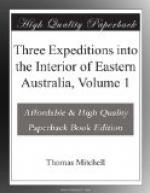MUIRHEAD AND WHITING SENT TO EXAMINE THE DRY CHANNEL OF THE RIVER.
We could not make them understand that we were in search of one of our party who was lost; neither could Muirhead and Whiting, who were returning to follow up Mr. Cunningham’s track, prevail on any of these natives to accompany them.
May 3.
The two men having departed to take up Mr. Cunningham’s track, I must here observe that the footsteps had not been discovered in the Bogan, either at our last camp or at this, although Whiting and Tom Jones had been in search of them when they found the man with a handkerchief; it was therefore most important to ascertain, if possible, where and under what circumstances the footsteps disappeared. The skill with which these men had followed the slightest impressions was remarkable; and I fixed my hopes on the result of their further exertions.
SEARCH EXTENDED TO THE PLAINS OF THE LACHLAN.
I cannot say that I then expected they would find Mr. Cunningham, conceiving it was more probable that he had left the Bogan and gone northward towards our stations on the Macquarie, a river distant only a short day’s journey from the Bogan. My anxiety about him was embittered with regret at the inauspicious delay of our journey which his disappearance had occasioned; and I was too impatient on both subjects to be able to remain inactive at the camp. I therefore set out, followed by two men on horseback, with the intention of reconnoitring the country to the southward, taking with us provisions for two days. After riding 17 miles, the first eight through thick scrub, we came into a more open and elevated country where we saw pigeons, as sign that water was not distant on some side of us. The hills were covered with a quartzose soil, containing angular fragments. The Callitris pyramidalis and the Sterculia heterophylla were among the trees. At 19 miles we crossed some dry ponds in open forest ground, and we then continued along fine flats for five miles more, when we again intersected the dry bed of the creek.
CAMP OF NATIVES.
Still pursuing the same direction, and having the watercourse near us on the left, we passed (at the distance of 26 miles) some native fires; but I was too anxious to examine the country before me to stop, although I saw some of the natives seated by them.
PASS THE NIGHT IN A HOLLOW WITHOUT WATER.
We soon after ascended a low ridge of mica-slate; beyond which we came again on the dry creek, and after crossing it several times we finally lay down for the night in its bed (which afforded the best grass) 33 miles from the party at Cudduldury. Although this watercourse was perfectly dry throughout yet it was an interesting feature in a valley enclosed on each side by undulating hills of mica-slate; and I thought of continuing in its course next morning, in hopes it might at last lead to some chain of ponds falling westward.




